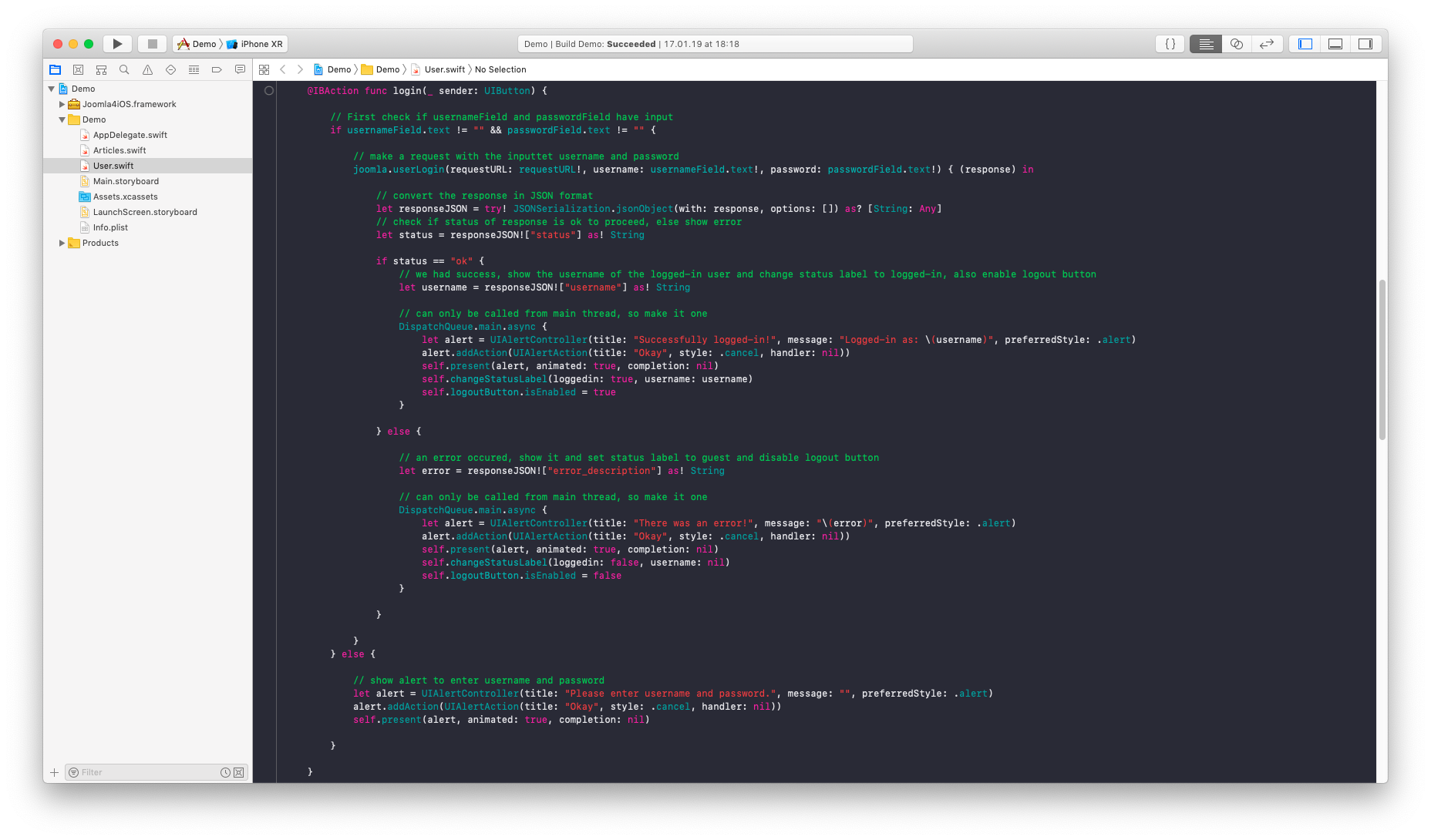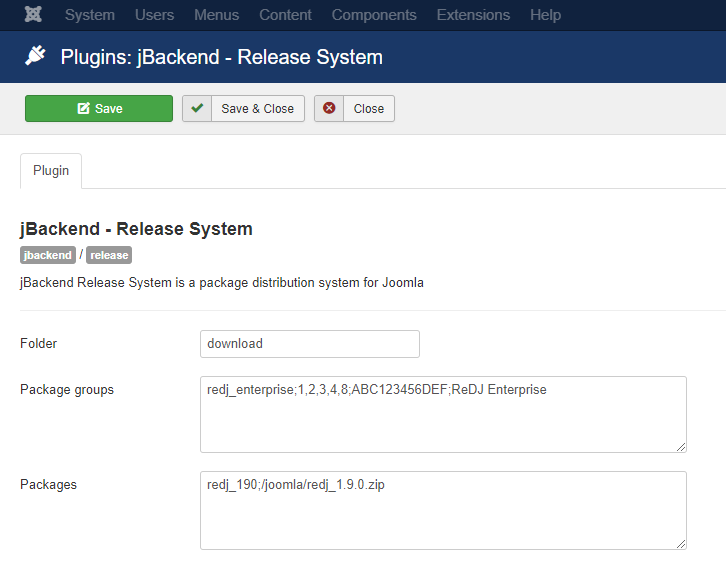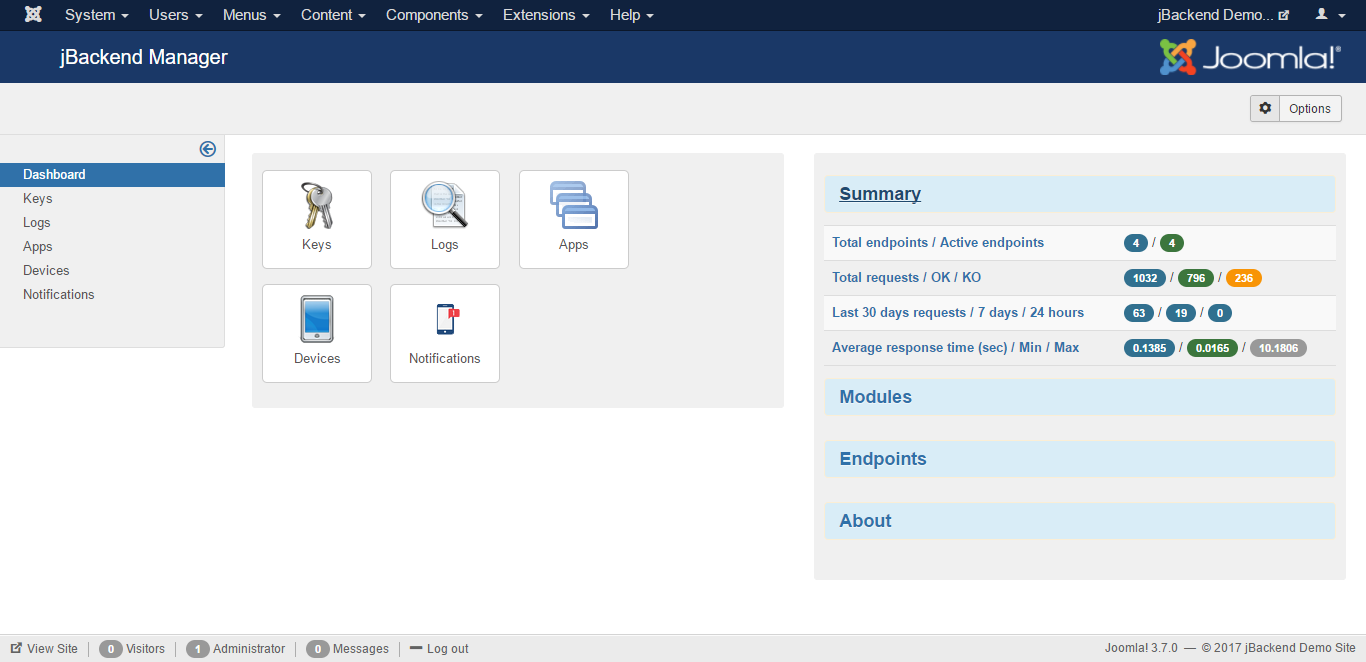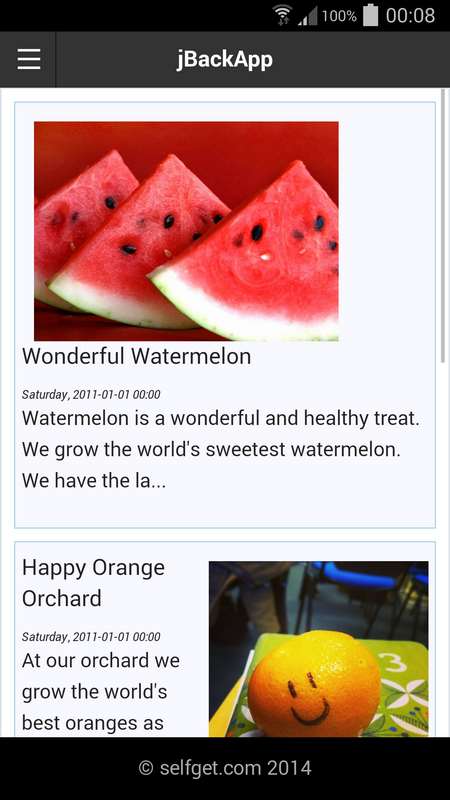Displaying items by tag: joomla
An iOS framework to build mobile apps with Joomla and jBackend
With Joomla4iOS you have the ability to easily implement your existing Joomla infrastructure within your iOS Apps. The framework is free and you don’t need any other dependencies.

An update server and package distribution system made (easy) with jBackend
Since version 1.6 Joomla has an Update System that allows you to update installed extensions automatically. And since January 10th 2017 supporting this system is almost mandatory for each extension.
jBackend Release System
jBackend Release System is a jBackend module that provides all features to implement a full Joomla Update Server and/or a generic Package Distribution System based on Joomla. It works with both jBackend and jBackend Community.
It can be used to distribute free packages, and paid packages as well. For paid packages the download restrictions are based on license keys, that are automatically generated and securely distributed to licensed users, authorized thorugh Joomla user's groups. Technical documentation is available here. An article that describes how it works can be found here.
Features
- Configurable packages distribution folder;
- Free and access restricted package distribution;
- Multiple package groups (releases in the same group share the license key);
- Multiple user groups can be enabled for each package group;
- Multiple package releases for each package group;
- Secret hash for each package group (increase security for generated license keys);
- Really lite (less than 700 lines of code).

jBackend Release System is released under GPL 2.0 license.
jBackend Community
jBackend Community is the lite version of jBackend available for free, no subscription required. It provides all the basic features to integrate Joomla content with mobile apps, syndication networks, affiliate networks and any external system, and it is mainly intended to give a chance to test jBackend capabilities, to develop and test new modules, and to provide some basic REST API integration features to a Joomla site.
When the upgrade to the full jBackend version is required, it is possible to install the full jBackend package over the Community version. The two versions share the same data tables and settings, and the upgrade process will preserve the configuration and all existing data.
The Community version is completely free, but doesn't provide the full functionalities available for jBackend. Here's a comparison matrix between jBackend Community and jBackend:
| Features | jBackend Community | jBackend |
|---|---|---|
| Extensible through plugins to increase API and support any Joomla extension |  (2 plugins in the package) |
 (3 plugins in the package, 7+ included with the subscription) |
| Support for publishing of multiple endpoints, each with its specific settings |  |
 |
| Three endpoint access type (free access, user authenticated only, API Key required) |  (free only) |
 |
| Tracing requests in the database for each endpoint |  |
 |
| Selection of jBackend plugins to enable for each endpoint |  |
 |
| API Key management interface |  (not used) |
 |
| Request log management interface |  |
 |
| Each API Key can have a max daily requests limit and an expiration date |  (not used) |
 |
| Each API Key can be targeted on separate endpoints |  (not used) |
 |
| Access control is compliant with integrated ACL |  (not used) |
 |
| Support for REST compliant requests |  |
 |
| JSON format for responses |  |
 |
| Support for session ID |  (only cookies) |
 |
| Get the list of articles by tag id (content module) |  |
 |
| Support for push notifications on iOS (APNs) and Android (GCM) |  |
 |
| Custom payload for push notifications |  |
 |
| Scheduled sending of push notifications |  |
 |
| Push notifications can be create and scheduled via API call |  |
 |
| Push notifications can be targeted on selected users, groups or devices |  |
 |
| License | GPL 2.0 | GPL 2.0 |
| Price | Free | 14 € (one year subscription) |
 |
 |
The basic extension package includes the jBackend component, that provides the general infrastructure for endpoints, and plugins support system. Also the following plugins are already included in the basic package:
- User Module: provides support for Joomla users (e.g. login, logout, registration);
- Content Module: provides support for standard Joomla content (e.g. categories and articles);
Additional plugins are available only with a valid jBackend Subscription and can be downloaded from here and installed separately. More info about jBackend can be found here
jBackend Community is released under GPL 2.0 license.
Another Tag Meta Community award
Just received this email and we are really proud that our work is still really appreciated.
A Push Notifications platfom for mobile apps with jBackend
Since version 3, jBackend introduced support for push notifications for Android and iOS, providing all needed functions to manage multiple mobile apps, to register devices and to send scheduled push notifications. The following video shows how to use jBackend to create a new application, to call the push register service to register a device, and the schedule and trigger a push notification.
jBackend Custom Modules
If you need to integrate your Joomla site with another system or offer a service through a set of accessible API, jBackend is the right extension for you. jBackend can be extended with custom plugins to support any kind of extension and provide any kind of service. There is a detailed documentation which explains how to create your own modules. And if you are not a programmer you can HIRE US and get the job done right.
Reasons for success with us:
- We have a long experience as system integrator;
- We are a Joomla experts with a great reputation from the community;
- We are cheap... really, prices from 20 euro;
- And moreover, we are the creators of jBackend, so we know what we do.
How to get in touch with us:
To request a quote without engagement, This email address is being protected from spambots. You need JavaScript enabled to view it. or compile a request form, or access to Client Manager and create a new project request.
How to create a simple mobile app with jBackend and Phonegap
Introduction
jBackend is a Joomla extension that introduces a set of APIs for access to all Joomla's content and features, and easily integrate any Joomla site with any external system. It extends the power of Joomla allowing you to use your site as a "backend system" to serve and feed any kind of client (mobile apps, news channels, affiliate sites, and any other external system).
jBackend also provides a full push notifications platform for iOS and Android mobile apps. It is possible to manage multiple apps, to register devices for each app, and to schedule push notifications sending on registered devices, filtered by app and platform type.
jBackend is designed to be "extensible" via plugins. Adding new plugins means to add new APIs to support new Joomla extensions. The basic package already includes three plugins, the User Module (that supports Joomla users and ACL), the Content Module (for the standard Joomla content, categories and articles), and the Push Module (to work with push notifications). New plugins are on the way, to add support for the most used Joomla extensions (e.g. K2, Zoo, VirtueMart, HikaShop, and so on). Additional plugins can be installed separately, so you can install and use only the necessary modules, and keep your CMS lightweight and efficient.
jBackend access is possible through an "end-point", that can be published like a menu item. It is possible to publish several end-points and configure access rules separately for each one. The access can be free, or restricted with a standard user login or through the use of an API Key. API Keys can be generated and configured (e.g. in terms of limitations like expiration or daily access) in jBackend panel. This allows full control on API access provided to clients.
It is possible to enable requests tracking for each endpoint separately. In this way all requests received from the endpoint are stored in the database and can be used for security audit or for statistical analysis.
It is also possible to enable specific modules for each endpoint separately. This increase the control level on the pool of functions or services to expose for each endpoint.
End-point channels can be accessed through HTTP, requests can be compliant to RESTful pattern, and responses are JSON encoded. In the future is expected to support the ability to provide XML responses.
jBackend
jBackend is a Joomla extension that gives you all the power of Joomla CMS through an extensible and pluggable set of REST API. With these API you can access to all site's contents and features, and use Joomla as a backend system for smartphone and mobile apps, syndication networks, external websites, and provide web services for any external system.
Furthermore jBackend provides a full push notifications platform for iOS and Android mobile apps. It allows to define multiple apps, to register devices for each app, and to schedule push notifications sending on registered devices, filtered by app and platform type.
Features
- Extensible through plugins to increase API and support any Joomla extension;
- Support for publishing of multiple endpoints, each with its specific settings;
- Three endpoint access type (free access, user authenticated only, API Key required);
- Tracing requests in the database for each endpoint;
- Selection of jBackend plugins to enable for each endpoint;
- API Key management interface;
- Request log management interface;
- Each API Key can have a max daily requests limit and an expiration date;
- Each API Key can be targeted on separate endpoints;
- Access control is compliant with integrated ACL;
- Support for REST compliant requests;
- JSON format for responses;
- Support for push notifications on iOS (APNs) and Android (GCM);
- Custom payload for push notifications;
- Scheduled sending of push notifications;
- Push notifications can be create and scheduled via API call;
- Push notifications can be targeted on selected users or groups.

The basic extension package includes the jBackend component, that provides the general infrastructure for endpoints, notifications, and plugins support system. Also the following plugins are already included in the basic package:
- User Module: provides support for Joomla users (e.g. login, logout, registration);
- Content Module: provides support for standard Joomla content (e.g. categories and articles);
- Push Module: provides support for push notifications (e.g. register device, send scheduled push);
Additional plugins can be downloaded from here and installed separately. Before to buy a subscription check here if what you need is already available, or submit a support request.
It is also possible to give it a try downloading and installing jBackend Community for free, a lite version created to give a chance to test jBackend capabilities, to develop and test new modules, and to provide some basic REST API integration features to a Joomla site.
jBackend is released under GPL 2.0 license.

